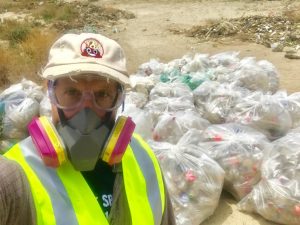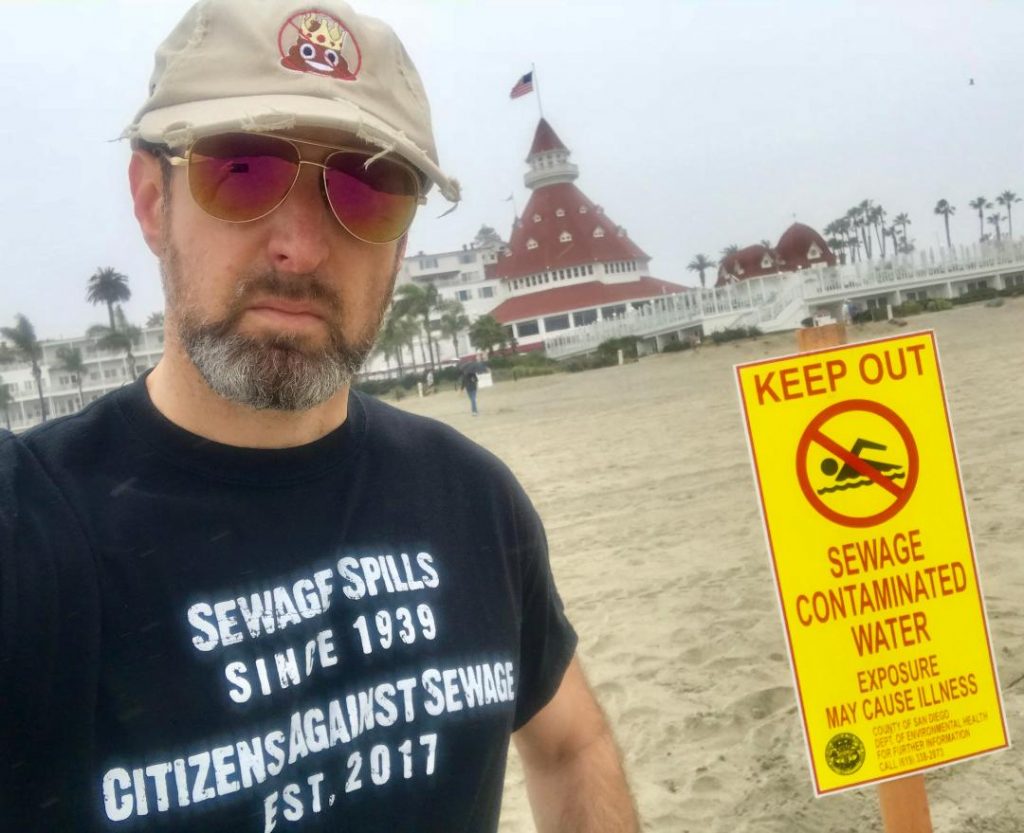Submitted by Daron Case
On behalf of Citizens Against Sewage (CAS) and Coronado Residents Against Poop (CRAP), I spoke at a press conference and the Coronado City Council meeting on Tuesday to call for unity and solidarity in the South Bay with respect to our regional transborder sewage crisis. I asked the City of Coronado to implement an “all of the above” approach which would include joining Imperial Beach in the sewage lawsuit for a united front. Yesterday, Coronado Mayor Richard Bailey issued a public statement that the City of Coronado is “committed to working with our regional partners on an ‘all of the above’ strategy to protect our beaches.” In reality, Coronado is only implementing a small fraction of the “all of the above” approach.
There are five prongs to the “all of the above” strategy with respect to our regional transborder sewage crisis:
- Litigation – fight for clean water in federal court
- Diplomatic approach on U.S. side of the border
- Diplomatic approach in Mexico
- Stakeholder Solutions
- Maximize public exposure to the problem
As examples, the City of Imperial Beach (IB) and Surfrider Foundation are taking the strongest action possible by implementing all five of the prongs to the “all of the above” approach, and that is precisely what I am asking Coronado to do.
Regarding litigation, in 2017 Coronado City Council voted in closed session not to join IB in the sewage lawsuit against the IBWC, but instead negotiated a “Reimbursement Agreement” with IB, wherein Coronado agreed to reimburse “up to” $50K of legal fees to IB based on litigation milestones. The Reimbursement Agreement contained a “gag order” in paragraph 6.1 prohibiting IB from criticizing Coronado’s approach to cross-border sewage in perpetuity. A year after executing the Reimbursement Agreement, IB realized it was a bad deal as Coronado had only reimbursed $5K for the filing of the complaint. Meanwhile, IB had incurred substantial legal fees for the lawsuit and approximately a quarter million dollars lobbying south of the border, so IB asked Coronado to bump up the remaining $45K. Coronado agreed, and it is money well spent as it buys them a gag order in perpetuity from IB, and allows Coronado to say they contributed to the lawsuit and lobbying efforts in Mexico. However, it is far-fetched to characterize this nominal contribution from Coronado as an ongoing “commitment” to the sewage litigation and diplomatic approach in Mexico.
There are many “stakeholders” in the South Bay and Tijuana River Valley (e.g., border patrol, military, municipalities, county, state, federal agencies, NGO’s, etc.). Each stakeholder has different legal, land ownership and health & safety concerns in the region as it relates to cross-border sewage. Over the decades there have been hundreds of multi-agency stakeholder meetings, and Coronado has not participated in many of them. Per Gabriela Torres (Surfrider Foundation attorney and policy coordinator for border sewage) there is a “Stakeholder Solution” gaining support amongst stakeholders now, and will soon be advanced diplomatically in D.C. Although Coronado is certainly a regional stakeholder being the city 2nd most adversely affected by beach closures from Mexican sewage, Coronado is not communicating with the other stakeholders about their diplomatic approach, nor has Coronado participated in the Stakeholder Solution. Instead, Coronado has essentially gone rogue with its “diplomatic approach” on the U.S. side of the border, which raises many concerns amongst the other stakeholders in the region. It is unclear whether Coronado is duplicating efforts already in motion, or of more concern, interfering in efforts to advance the Stakeholder Solution.
I sent an email to City Council yesterday suggesting the formation of a “sewage working group” with representatives from different stakeholders including NGO’s and municipalities in the region, with the objective to encourage communication between the City of Coronado and other stakeholders, and help guide Coronado on its diplomatic approach. I have not received a reply.
The final prong to the “all of the above” approach is maximizing public exposure to the problem. As examples, Imperial Beach and Surfrider routinely hold press conferences to raise awareness to the sewage crisis and call for federal assistance utilizing the media. To contrast, the City of Coronado’s approach is to downplay, deny and dismiss the sewage problem on Coronado beaches. The City of Coronado routinely downplays beach closures along the Silver Strand as it is a “state beach.” The Silver Strand is adjacent to Imperial Beach, therefore closer than beaches in town to the source of contamination – closer to Mexico and the Tijuana River. The Silver Strand is within Coronado city limits. For residents of the Coronado Cays, the Silver Strand is our local beach. Guests of the Loews use the Silver Strand. The City derives substantial transient occupancy tax (TOT) revenue from the Loews. Border Patrol and Navy SEALs work and train along the Silver Strand. Coronado residents should no longer allow the City of Coronado to downplay sewage contamination and beach closures along the Silver Strand. Imperial Beach and City of San Diego have ongoing declarations of emergency as it relates to cross-border sewage.  Every time Coronado beaches are closed, it is an opportunity for Coronado to declare a state of emergency for cross-border sewage, however Coronado chooses not to do so. The Coronado Citizens Coalition has recently asked the City of Coronado to issue beach closure alerts via a platform for public safety notifications called “Nixle,” however the City of Coronado that has two Nixle accounts (City and CPD) has inexplicably chosen not to issue Nixle alerts for beach closures because they say it is “not appropriate.” The City of Coronado that derives substantial TOT revenue from its four major hotels including the Hotel del Coronado appears more interested in receiving top 10 beach rankings than broadcasting to the public that our beaches are routinely fouled by cross-border sewage. Joining a sewage lawsuit would no doubt draw national attention to Coronado’s cross-border sewage problem. For sewage activists, NGO’s and other stakeholders in the region, such national attention is part of the solution.
Every time Coronado beaches are closed, it is an opportunity for Coronado to declare a state of emergency for cross-border sewage, however Coronado chooses not to do so. The Coronado Citizens Coalition has recently asked the City of Coronado to issue beach closure alerts via a platform for public safety notifications called “Nixle,” however the City of Coronado that has two Nixle accounts (City and CPD) has inexplicably chosen not to issue Nixle alerts for beach closures because they say it is “not appropriate.” The City of Coronado that derives substantial TOT revenue from its four major hotels including the Hotel del Coronado appears more interested in receiving top 10 beach rankings than broadcasting to the public that our beaches are routinely fouled by cross-border sewage. Joining a sewage lawsuit would no doubt draw national attention to Coronado’s cross-border sewage problem. For sewage activists, NGO’s and other stakeholders in the region, such national attention is part of the solution.
To summarize, the City of Coronado is “committed” to only one of the five prongs for the “all of the above” approach – and that is a diplomatic approach on the U.S. side of the border. However, Coronado is pursuing this diplomatic approach without stakeholder communication, which could be counterproductive to the cause. To reiterate, I am asking Coronado to implement “all of the above” (i.e., all five prongs), just like the City of Imperial Beach and Surfrider Foundation. I do realize that if Coronado is unwilling to issue a Nixle alert for beach closures, it is exceedingly unlikely Coronado will join a sewage lawsuit and/or implement any other approach than what they are currently doing – which is going rogue and claiming credit for solving the sewage crisis. You won’t find Imperial Beach public officials denying that Coronado has solved the sewage crisis, because there is a gag order in effect… forever. Meanwhile, the rain and beach closures keep coming.
Daron A. Case, Esq.
Citizens Against Sewage (CAS)
Coronado Residents Against Poop (CRAP)





